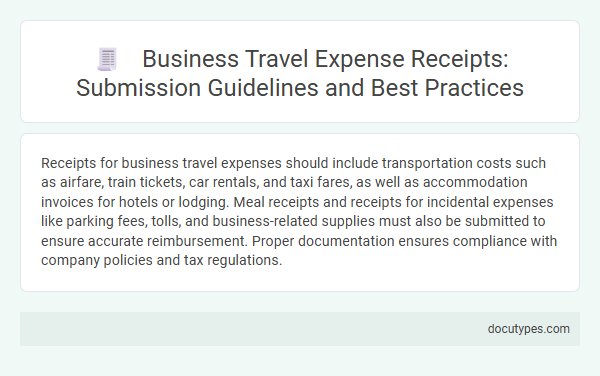Receipts for business travel expenses should include transportation costs such as airfare, train tickets, car rentals, and taxi fares, as well as accommodation invoices for hotels or lodging. Meal receipts and receipts for incidental expenses like parking fees, tolls, and business-related supplies must also be submitted to ensure accurate reimbursement. Proper documentation ensures compliance with company policies and tax regulations.
Introduction to Business Travel Expense Receipts
Receipts play a crucial role in documenting business travel expenses for accurate reimbursement and accounting. Properly submitted receipts ensure compliance with company policies and tax regulations.
You should submit receipts that clearly detail the date, vendor, amount, and purpose of each expense. Common receipts include those for transportation, lodging, meals, and incidentals incurred during business trips.
Importance of Submitting Accurate Receipts
Receipts for business travel expenses must include detailed information such as dates, merchant names, itemized purchases, and payment amounts. Submitting accurate receipts ensures compliance with company policies and simplifies the reimbursement process. Your attention to providing precise documentation helps maintain financial transparency and avoid delays in expense approvals.
Standard Receipt Requirements for Business Travel
Receipts submitted for business travel expenses must clearly display the date, vendor name, and detailed description of the purchased items or services. Standard receipts should include the total amount paid and evidence of payment, such as a credit card slip or proof of cash transaction. Accurate and itemized receipts ensure compliance with company policies and facilitate proper reimbursement processing.
Acceptable Forms of Travel Expense Receipts
Submitting proper receipts is essential for validating business travel expenses. Accurate documentation ensures compliance with company policies and tax regulations.
- Original Receipts - Physical or digital copies of original receipts from vendors must be submitted to verify expenses.
- Itemized Receipts - Receipts should clearly list each purchased item or service to provide detailed expense information.
- Electronic Receipts - Email confirmations or app-generated receipts are acceptable if they include transaction details and company information.
Receipts lacking necessary details or proof of payment may be rejected for reimbursement.
Electronic vs. Paper Receipts: Submission Protocols
For business travel expenses, submission protocols differ between electronic and paper receipts to ensure proper documentation and reimbursement. Understanding these distinctions helps maintain compliance and smooth processing.
Electronic receipts must be submitted in a clear, readable digital format such as PDF or JPEG, often through a company's expense management system. Paper receipts require scanning or photographing before submission, preserving original details for verification. You should retain original paper copies until reimbursement confirmation is received.
Common Mistakes to Avoid in Receipt Submission
Receipts for business travel expenses must clearly show the date, vendor, and amount paid. Common receipts include hotel bills, airline tickets, meal invoices, and taxi fares.
Avoid submitting blurry or incomplete receipts as they may be rejected during expense auditing. Ensure receipts are itemized and match the travel dates and purpose precisely.
Timelines and Deadlines for Expense Receipt Submission
What receipts should be submitted for business travel expenses to ensure timely reimbursement? Receipts must include transportation, lodging, meals, and incidentals with clear dates and amounts. Submit all receipts within 30 days of travel completion to comply with company deadlines.
Best Practices for Organizing Travel Receipts
| Receipt Type | Description | Best Practices for Organization |
|---|---|---|
| Transportation | Receipts for airfare, train tickets, taxi or ride-share services, car rentals, and fuel expenses. | Keep original or digital copies dated and itemized, noting the purpose of the trip and destination clearly on each receipt. |
| Accommodation | Invoices from hotels or short-term rentals including room charges, taxes, and fees. | Store invoices with check-in and check-out dates visible; highlight business-related stays versus personal extensions. |
| Meals | Receipts from restaurants, cafes, and other food vendors during travel. | Ensure receipts list itemized expenses and attach explanations if multiple people are included; exclude personal meals. |
| Miscellaneous Expenses | Receipts for parking, tolls, internet charges, and business-related supplies. | Maintain detailed records with notes on how each expense supports the business trip; group by category for easy reference. |
| Digital Methods | Scanned images or photos of physical receipts and mobile app-generated receipts. | Use consistent naming conventions and secure cloud storage; back up receipts regularly to prevent loss. |
Policy Compliance and Audit Procedures
Submitting the correct receipts for business travel expenses ensures policy compliance and streamlines audit procedures. Accurate documentation supports expense validation and prevents reimbursement delays.
- Itemized Receipts - Provide detailed receipts showing the date, vendor, and amount for each business-related purchase.
- Proof of Payment - Include credit card statements or canceled checks to verify expenditures align with submitted receipts.
- Travel Itinerary and Approval - Attach approved travel plans and authorization forms to substantiate the business purpose of expenses.
What Receipts Should Be Submitted for Business Travel Expenses? Infographic

